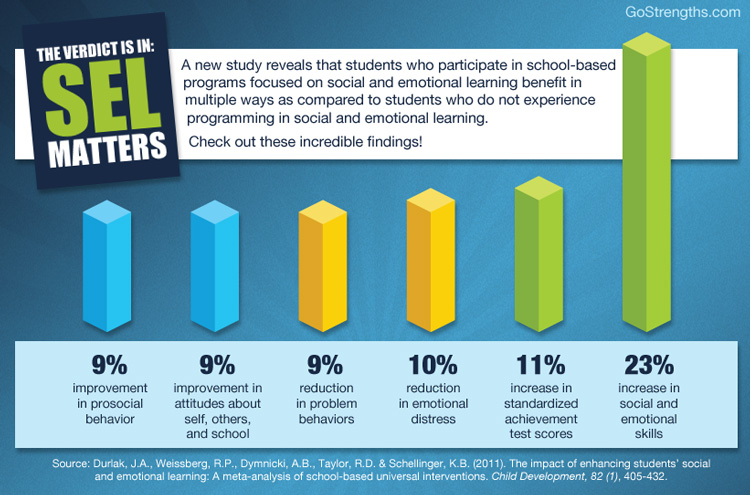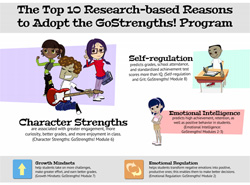Why does Social and Emotional Learning Matter?
Research reveals that the emotional centers of the brain are intricately woven with cognitive learning. When a student is immersed in distressing emotions, the centers for learning are hampered. It naturally follows that a student’s ability to listen, comprehend, and retain what a teacher or book conveys is then compromised. In short, there is a direct association between emotions and learning. Fortunately, social and emotional learning courses can both reduce emotional distress in children and boost academic success and well-being.
A landmark review (pdf) of over 213 social and emotional learning interventions including over 270,034 kindergarten through high school students found that those students who receive SEL instruction not only had more positive attitudes about school, they also improved an average of 11 percent on standardized achievement tests compared to students who did not receive such instruction.

GoStrengths! Promotes Academic & Life Success
As Nobel laureate, economist, and renowned researcher of early childhood education programs, James Heckman, put it, “Test scores explain only a tiny fraction of the variability among individuals — who’s successful and who’s not — other factors are out there that aren’t measured and that aren’t even accounted for in public policy that make a big difference.”
GoStrengths! focuses on those “other” factors which can improve both academic and life success.
10 research-based reasons to adopt a GoStrengths! program:
- Self-regulation in students can predict grades, school attendance, and standardized achievement test scores even more than IQ. (Self-regulation and Grit: GoStrengths! Module 8)
- Character strength cultivation is associated with greater engagement, more curiosity, better grades, and more enjoyment in class. (Character Strengths: GoStrengths! Module 6)
- Emotional regulation skills allow students to quickly transform negative emotions into positive, productive ones; this enables them to make better decisions. (Emotional Regulation: GoStrengths! Module 2)
- Emotional intelligence predicts high achievement, retention, as well as positive behavior in students. (Emotional Intelligence: GoStrengths! Modules 2-3)
- Growth mindset students take on more challenges, make greater effort, and get better grades. (Mindsets: GoStrengths! Module 7)
- Social support from friends and family predicts better physical health and greater life satisfaction. (Social connections: GoStrengths! Module 9)
- Mental contrasting in combination with goal-setting increases a student’s ability to reach goals. (Goal Setting: GoStrengths! Module 10)
- Active-constructive responding is associated with cultivating stronger social relationships. (Social Connections: GoStrengths! Module 9)
- Resilience skills can both reduce and protect against symptoms of depression and anxiety. (Resilience Skills: GoStrengths! Module 4)
- Happier students earn more money over their lifetime, are more productive and creative at work, become better negotiators, are more likely to get married, enjoy better relationships and longer marriages, cultivate more friendships, are more pro-social, cope better with stress and trauma, have greater protection against heart disease and stroke, and live longer. (Happiness Skills: GoStrengths! All Modules)
References
Diener, E., Nickerson, C., Lucas, R. E., & Sandvik, E. (2002). Dispositional affect and job outcomes. Social Indicators Research, 59(3), 229-259.
Duckworth, A.L., Peterson, C., Matthews, M. D., & Kelly, D. R. (2007). Grit: Perseverance and passion for long-term goals. Journal of Personality and Social Psychology, 92(6), 1087-1101.
Duckworth, A.L., Seligman, M.E.P.S. (2005). Self-Discipline Outdoes IQ in Predicting Academic Performance of Adolescents. Psychological Science, 16, 939-944.
Durlak, J., Weissberg, R., Dymnicki, A., Taylor, R., & Schellinger, K. (2011). The Impact of Enhancing Students’ Social and Emotional Learning: A Meta-Analysis of School-Based Universal Interventions. Child Development, 82(1), 405-432.
Dweck, C. (2002). Messages that motivate: How praise molds students’ beliefs, motivation, and performance (in surprising ways). In J. Aronson (Ed.), Improving Academic Achievement: Impact of Psychological Factors on Education (Educational Psychology), (pp. 37-60). San Diego, CA, US: Academic Press.
Dweck, C. (2007). Mindset: The New Psychology of Success. New York: Ballantine Books.
Ellis, A., & Bernard, M. E. (2006). Rational emotive behavioral approaches to childhood disorders theory, practice and research. New York: Springer.
Finchman, F.D. (2000). Optimism and the family. In J.E. Gillham (Ed.), The science of optimism and hope: Research essays in honor of Martin E.P. Seligman. Laws of life symposia series. (pp. 271‑298). West Conshohocken, PA, US: Templeton Foundation Press.
Fredrickson, B. (2009). Positivity: Groundbreaking research reveals how to embrace the hidden strength of positive emotions, overcome negativity, and thrive. New York, NY, US: Crown Publishers/Random House.
Gable, S. L., Reis, H. T., Impett, E., & Asher, E. R. (2004). What do you do when things go right? The intrapersonal and interpersonal benefits of sharing positive events. Journal of Personality and Social Psychology, 87, 228-245.
Goleman, D. (1995). Emotional intelligence. New York: Bantam Books.
Kahneman, Daniel. Thinking, fast and slow. New York: Farrar, Straus and Giroux, 2011.
Masten, A.S., Best, K., Garmezy, N. (1990). Resilience and development: Contributions from the study of children who overcome adversity. Development and Psychopathology, 2 , pp 425-444
Park, N., & Peterson, C. (2009). Character strengths: Research and practice. Journal of College and Character, 10(4), np.
Peterson, C., & Seligman, M. E. (2004). Character strengths and virtues: a handbook and classification. New York: Oxford University Press/Washington, DC: American Psychological Association
Reivich, K., Gillham, J. E., Chaplin, T. M., & Seligman, M. E. P. (2005). From helplessness to optimism: The role of resilience in treating and preventing depression in youth. New York, NY, US: Kluwer Academic/Plenum Publishers.
Reivich, K., & Shatté, A. (2002). The resilience factor: 7 essential skills for overcoming life’s inevitable obstacles. New York: Broadway Books.
Uchino, B. N., Cacioppo, J. T., & Kiecolt-Glaser, J. K.(1996). The relationship between social support and physiological processes: a review with emphasis on underlying mechanisms and implications for health. Psychological Bulletin, 119(3), 488-531.
Wolf, S., & Bruhn, J. G. (1993). The power of clan: the influence of human relationships on heart disease. New Brunswick, N.J.U.S.A.: Transaction Publishers.
